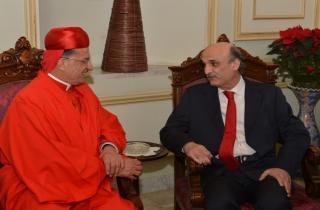 Lebanese Forces leader MP Samir Geagea defended Maronite Patriarch Beshara al-Rai’s stance over the presidential vacuum , describing the vacuum as a “crime” against the Lebanese and stressing that it is hindering the work of the cabinet and the parliament.
Lebanese Forces leader MP Samir Geagea defended Maronite Patriarch Beshara al-Rai’s stance over the presidential vacuum , describing the vacuum as a “crime” against the Lebanese and stressing that it is hindering the work of the cabinet and the parliament.
“Maronite Patriarch Beshara al-Rai’s stance is right in pressing for a solution but things should be called as they are,” Geagea said, stressing that politicians should be held accountable for the delay in electing a new president to replace Michel Suleiman whose term ended last May 25.
Geagea said in remarks published on Monday’s al-Mustaqbal newspaper that all parliamentary blocs are attending sessions set to elect a new president except for the Change and Reform and Hezbollah blocs.
“Both blocs are impeding the polls for various reasons,” Geagea pointed out.
Rai sounded outraged on Sunday over the ongoing delay in electing a new president to replace Suleiman
“The Patriarch’s outrage is increasing over the ongoing presidential vacuum,” Rai’s visitors quoted him as saying in comments published in al-Mustaqbal newspaper on Sunday .
“He is tired of waiting while the rival parties agree on the name of a nominee… He has waited for a long time but they failed to reach common ground,” sources were quoted as saying.
The next elections session is set for July 23.
Background information
The Lebanese lawmakers failed again July 2 to elect a president for the eighth time, prolonging a political vacuum as the country struggles with violence, economic decline and an influx of Syrian refugees.
After Geagea secured 48 votes last April 23, the Hezbollah led March 8 alliance including FPM leader Michel Aoun and Marada leader Suleiman Franjieh walked out from the parliament to make sure there was no quorum to elect a president. They continued their boycott of the parliament during the 7 other sessions that followed .
Both Aoun and Franjieh boycotted also the July 2 session.
Aoun has not announced his candidacy but he aspires to become a consensual nominee
“I will announce my nomination when the political situation in parliament becomes clear and when (the current candidates) are dismissed,” Aoun said last month.
The civil war in neighbouring Syria has aggravated long-standing rivalries in Lebanon, where political power is divided among religious communities – the presidency goes to a Maronite Christian, the parliament speaker is a Shi’ite Muslim and the prime minister a Sunni.
Some of Lebanon’s deepest political divisions come over the handling of the Syrian crisis, which has driven over 1 million refugees into Lebanon.
Politicians from the March 8 coalition, which includes Shi’ite Muslim group Hezbollah, support Syrian President Bashar al-Assad. The rival March 14 coalition backs Assad’s opponents.
The deadlock comes at a time of worsening security. Three suicide bomb attacks late last month targeted Beirut and a checkpoint on the road to Syria. The Syrian crisis and the political stalemate have also hit the Lebanese economy, prompting the central bank to introduce stimulus packages.

Leave a Reply
You must be logged in to post a comment.